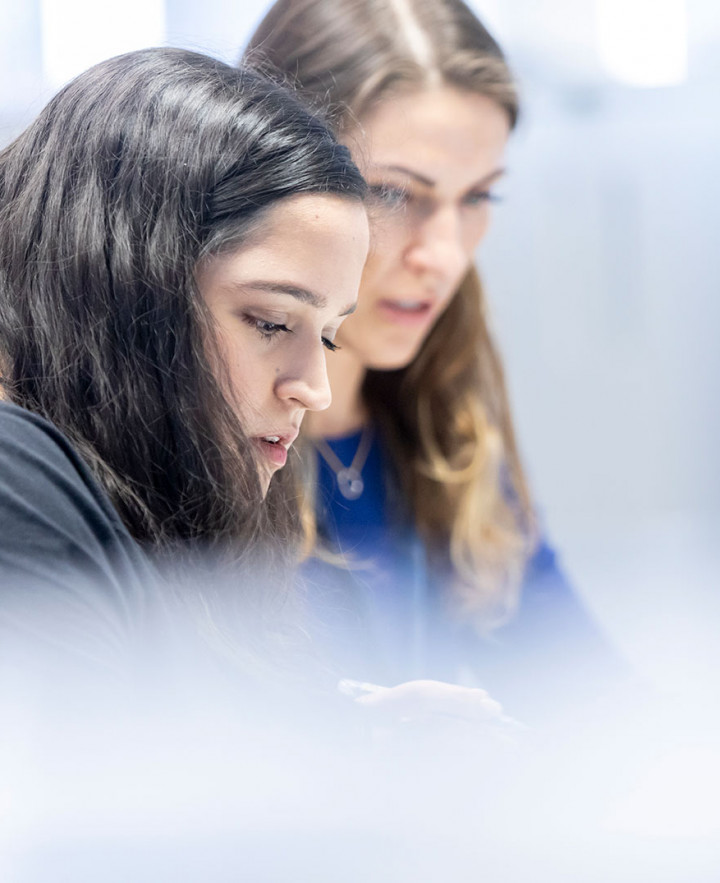Graduate programme application – My experience of navigating the application process Q&A
Life after university can be overwhelming, especially with the additional pressure of choosing the right career path and landing a graduate role. In this Q&A, we speak to Alyssa Young and Madeleine Morgan, two of our September 2024 Graduate cohort, as they share their experiences of navigating the application process and securing positions as Trainee Fund Accountants. They also reflect on their first six months in the industry and discuss how they see their roles evolving in the future.
Whether you are considering applying or curious about the next steps once you have secured a graduate role, this Q&A provides insight into the experience of staring a career at Langham Hall.
Contributors
Alyssa Young and Madeleine Morgan
Trainee Fund Accountants
Q: How did you decide what jobs to apply for after graduation? Did you always have a career path in mind?
MM: Navigating the vast number of post graduate career paths is overwhelming. I structured my job search by defining my key criteria and narrowing down the opportunities that met them. One of the most important factors was starting a role which was designed specifically for recent graduates and centred around structured training, a strong peer network and a clear path for professional growth. By focusing on this, among other qualities that I had priorities I refined my search to find a role that aligned with my long-term goals, ultimately leading me to Langham Hall.
AY: It initially felt quite overwhelming looking for jobs after university, especially as I did not have a clear career path in mind, and it felt difficult to know what opportunities to apply for. I knew that I wanted to work in the financial sector and the role of Trainee Fund Accountant really appealed to me as I didn’t need to have an in-depth knowledge of fund accounting prior to starting. One of the key factors I was looking for in a job was support throughout both the workday and studying for my professional qualifications; this was something that really stood out to me about Langham Hall.
Q: What degree did you do, and does it relate to your job?
MM: Whilst at university, I studied history because I wholeheartedly enjoyed the subject. While the content of my degree isn’t directly applicable to my day-to-day job, it provided me with a wealth of transferable skills. Studying history honed my attention to detail and ability to assimilate vast amounts of information – an essential balance when working with financial data and complex reports.
I wouldn’t say that deciding to study History rather than accounting or finance has hindered me in any way; if anything, it has given me a different perspective and sharpened my critical and analytical thinking.
AY: One of the parts I really enjoyed about my degree in maths and physics was the mix of theoretical and practical work, and I wanted to choose a career that replicated this. Whilst I did not have initial experience in accounting and finance when starting at Langham Hall, I have found that it has not held me back, and everyone in my team has been incredibly helpful and willing to answer any questions that I have no matter how many times I ask them.
Q: Why Langham Hall?
MM: There are three main factors which made me choose Langham Hall. Firstly, the apprenticeship model (‘learn on the job’ approach); the role allows graduates to build technical knowledge while gaining practical experience in fund accounting. Secondly, the structured graduate programme; there is a clear pathway for development, which was particularly important to me since I didn’t study finance or accounting at university.
Lastly, the exposure to real-world fund management; the Trainee Fund Accountant role at Langham Hall offers a huge scope of growth and immerses its graduates into the industry from day one – working with experienced professionals and gaining hands-on experience in fund administration.
AY: One of the aspects that drew me to Langham Hall was the emphasis on mentoring and the apprenticeship model. There was a reassurance when starting that there would be support not only during the workday, but also throughout my professional qualifications. Having not had experience with accounting before, it was important to me to find a company that provided support throughout my ACCA studies which is why Langham Hall’s study leave policy really stood out to me. Visiting the office during the Assessment centre day also reinforced the idea of a supportive and friendly culture which was another key factor I was looking for in a workplace.
Q: What have the first six months on the graduate scheme been like?
AY: As with starting any job, I initially had worries about being able to understand the work and systems, but my team has been very supportive and willing to answer any questions that I have that I have found it easy to settle in and understand my role. Being given responsibilities and work of my own from such an early stage was a plus as it helped build my confidence with using the systems and establishing how I fit within the team. Each day has brought new tasks and challenges, and I have really enjoyed learning more about the clients and developing the skills I need to perform tasks effectively.
Q: How do you see yourself evolving in your career at Langham Hall and what are your long-term goals?
MM: Fund management is an industry that is growing rapidly. I’m keen to continue developing my expertise within it and deepen my technical knowledge by gaining more exposure over time. Currently, I am aiming to work towards professional qualifications that will support my progression in the private funds sector.
AY: My main goal for the next few years is to pass my exams and become qualified, which would lead to being able to take on more responsibilities within my team and with the clients.
Q: Give us some insight into the application process; what did you have to do?
AY: The first stage of the application process was to complete a written and logic test, followed by a short online interview, and finally the assessment centre day. The assessment centre was a great opportunity to learn more about the role, company and also gave me the opportunity to meet some of the teams I would be working with as well as other graduates. Being able to visit the London office offered a great insight into the culture and day-to-day aspect of the company.
Q: Why do you think you were successful?
AY: One of the key aspects to demonstrate during any interview or assessment centre is a genuine interest in the company and the role. It’s important to be prepared and do some research about the company, but also to ask questions about the job and to find out if it’s a good match for you. When it comes to the in-person interviews, being able to show that you are interested and engaged with the role, whilst at the same time being a good fit for the team are key for being successful during the application process.
Q: Do you have any recommendations for anyone wanting to pursue a career in the Private Funds sector?
MM: My best piece of advice is to be curious. Rather than feeling pressured to know everything immediately, focus on developing a mindset of continuous learning; through research, asking questions, and seeking guidance from those with more experience. As the private funds sector is constantly evolving, developing a habit of reading industry news, following market developments, and thinking critically about how external factors might impact the industry will expand your knowledge and help you engage in conversations with colleagues and learn even more.
AY: My main piece of advice would be to do research about the sector and find opportunities that interest you. Showing enthusiasm and understanding the industry is important when applying to roles. Starting a new job is an exciting prospect and being open to learning and development is a great way to progress and develop in any field.
Our trainee programmes are aimed at kickstarting your career in the funds sector, covering illiquid asset classes such as private equity, real estate and infrastructure, developing your skills and knowledge to allow you to make an impact in our business and industry.
We are pleased to announce that the applications are now open to join the September 2025 cohort of Trainee Fund Accountants.

